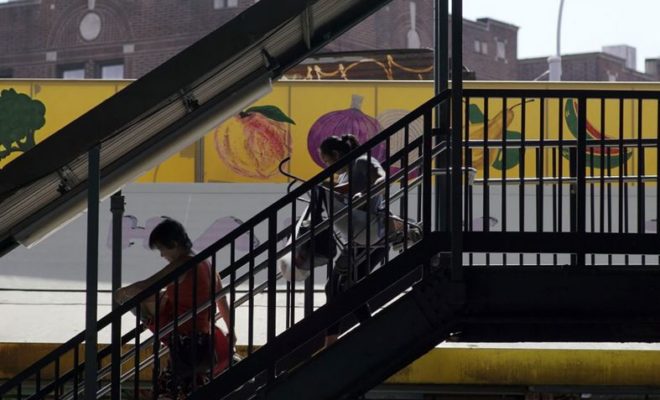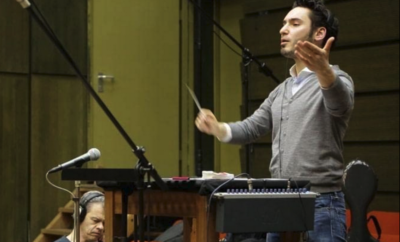
Movie Reviews
Elevator Pitch
By: Kelly Kearney
New York City – a booming metropolis of nine million residents inhabiting a city that prides itself on its diversity as much as its fast-paced lifestyle. On any given day 5.5 million New Yorkers rely on the subway to get from point A to B, but for some residents this convenient form of transportation is out of their reach. Ask any New Yorker if the Mass Transit system is safe and easy to use and they will probably tell you it’s the life force of the city while also rattling off complaints about train breakdowns, hygiene and the rise in fare costs that result in zero updates. They are the complaints and praises of the privileged majority but lost in the cheers and jeers are the voices of the rarely heard. The subway in all of its windy steep staircases to rickety trains of glory, was designed for the abled bodied city dwellers. Its convenience is only afforded to those that can easily navigate the steep station steps to the crowded platforms, making the daily commute for disabled persons a total nightmare. In Martyna Starosta’s documentary short Elevator Pitch we head to an Metropolitan Transportation Authority meeting where the voices of those left behind demand to be heard. After all, if the city relies on human productivity, shouldn’t the transportation system ensure all New Yorkers have access to it so they can remain productive? Isn’t this the city that welcomes all walks of life? Or has walking become the deciding factor in whom the welcome mat is laid out for?
The Call for Change
On January 28, 2019 a young mother named Malaysia Goodson was trying to navigate the Seventh Avenue station steps with her one-year old daughter. In her struggle to carry her child and her belongings Malaysia fell, landing on the concrete platform and subsequently losing her life. Luckily, her daughter managed to survive the fall but the tragedy that ended this mother’s life is a fear that many live with daily. Whether you are carrying your child, struggling with old age and health problems or you’re bound to a wheelchair, the subway can be a stark reminder of how often society ignores the plight of the few to make life easier for the many. Like Goodson, injuries incurred on the subway steps have racked up lawsuits against the city and the MTA for years. This documentary is not only a warning that Malaysia will not be the last life lost on the steps, but it also highlights the hope that voices of dissent can force the powers that be to make the changes that have been promised for over decade. In Elevator Pitch we listen to thirty-six hours of public testimony from frustrated community members who feel the city and the MTA haven’t done enough to make their system accessible to all. It’s the voices of the ignored who have been promised for the last fifteen years that change is coming, only for nothing to change but the price of the fares.
With approximately one million disabled persons living in New York who require an elevator to take them from the streets to the trains, it’s astonishing that only about one quarter of the stations around the city have elevators. Transportation, in a city that isn’t car friendly, is as important as any other daily struggle for success.
The Unseen and Struggling
The most startling peek into life as a disabled New Yorker comes from documenting the world below the city. As we listen to the testimony of the people who have witnessed and survived tragedies like Malaysia Goodson, the camera stays fixated on the underground world. It weaves together desperate voices asking for help with a visual that is undeniably cruel. To Starosta’s credit she doesn’t shy away from the uncomfortable. The filmmaker does an excellent job of setting the mood by focusing the camera on a wheelchair bound man having to make his way up two flights of steps. Asking a stranger to carry his wheelchair the man drags his body step by step through crowds of people trying to hurry past him. This man cannot count on his city to help him. Instead, he is forced to rely on the kindness of strangers and his own upper body strength – of which he is extremely fortunate to have both. The subway riders and the MTA are blind to his struggle, like they are with so many, and there doesn’t seem to be a plan of action to fix this no matter how high New York taxes are inflated. Change needs money, but even with it nothing seems to alter. It is the problem of the minority in a world where the majority often rules and living in a city where only the strong survive. But there is strength in disabilities and productivity in the people who society feels a lack of participation from. It’s their voices the director hopes will illicit change and with offering them a platform to be heard maybe one day it could be achieved.
In its fifteen minutes of gritty glory, Elevator Pitch successfully shows why all New Yorkers deserve access to transportation, but sadly so far not all are granted an equal opportunity to take that ride. Unfortunately, with over a decade of failed promises, all that seems to be left is a fiery anger that can only be expressed in true New York fashion such as an elderly woman with weak legs finding her power by screaming expletives at a broken-down escalator. Her rage is palpable and it elicits a level of empathy the filmmaker is trying to stir in the very people who can bring forth the change New York needs.
Elevator Pitch is a worthy documentary that is a must see, even if you’re not a card-carrying New Yorker. So, the next time your feet hit that concrete jungle and you’re about to hop on the train Uptown, take notice of ones those train leave behind and maybe help carry a wheelchair or a stroller down the steps. Malaysia Goodson’s family would thank you




You must be logged in to post a comment Login